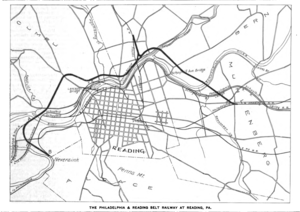| Reading Belt Branch | |||||||||||||||||||||||||||||||||||||||||||||||||||||||||||||||||||||||||||||||||||||||||||||||||||||||||||||||||||||||||||||||||||||||||||||||||||||||||||||||||||||||||||||||||||||||
|---|---|---|---|---|---|---|---|---|---|---|---|---|---|---|---|---|---|---|---|---|---|---|---|---|---|---|---|---|---|---|---|---|---|---|---|---|---|---|---|---|---|---|---|---|---|---|---|---|---|---|---|---|---|---|---|---|---|---|---|---|---|---|---|---|---|---|---|---|---|---|---|---|---|---|---|---|---|---|---|---|---|---|---|---|---|---|---|---|---|---|---|---|---|---|---|---|---|---|---|---|---|---|---|---|---|---|---|---|---|---|---|---|---|---|---|---|---|---|---|---|---|---|---|---|---|---|---|---|---|---|---|---|---|---|---|---|---|---|---|---|---|---|---|---|---|---|---|---|---|---|---|---|---|---|---|---|---|---|---|---|---|---|---|---|---|---|---|---|---|---|---|---|---|---|---|---|---|---|---|---|---|---|---|
 Map showing the new part of the Reading Belt Branch from north Reading to Cumru Junction Map showing the new part of the Reading Belt Branch from north Reading to Cumru Junction | |||||||||||||||||||||||||||||||||||||||||||||||||||||||||||||||||||||||||||||||||||||||||||||||||||||||||||||||||||||||||||||||||||||||||||||||||||||||||||||||||||||||||||||||||||||||
| Overview | |||||||||||||||||||||||||||||||||||||||||||||||||||||||||||||||||||||||||||||||||||||||||||||||||||||||||||||||||||||||||||||||||||||||||||||||||||||||||||||||||||||||||||||||||||||||
| Owner | Norfolk Southern Railway | ||||||||||||||||||||||||||||||||||||||||||||||||||||||||||||||||||||||||||||||||||||||||||||||||||||||||||||||||||||||||||||||||||||||||||||||||||||||||||||||||||||||||||||||||||||||
| History | |||||||||||||||||||||||||||||||||||||||||||||||||||||||||||||||||||||||||||||||||||||||||||||||||||||||||||||||||||||||||||||||||||||||||||||||||||||||||||||||||||||||||||||||||||||||
| Opened | October 27, 1902 (1902-10-27) | ||||||||||||||||||||||||||||||||||||||||||||||||||||||||||||||||||||||||||||||||||||||||||||||||||||||||||||||||||||||||||||||||||||||||||||||||||||||||||||||||||||||||||||||||||||||
| Technical | |||||||||||||||||||||||||||||||||||||||||||||||||||||||||||||||||||||||||||||||||||||||||||||||||||||||||||||||||||||||||||||||||||||||||||||||||||||||||||||||||||||||||||||||||||||||
| Line length | 18.8 mi (30.3 km) | ||||||||||||||||||||||||||||||||||||||||||||||||||||||||||||||||||||||||||||||||||||||||||||||||||||||||||||||||||||||||||||||||||||||||||||||||||||||||||||||||||||||||||||||||||||||
| Track gauge | 1,435 mm (4 ft 8+1⁄2 in) standard gauge | ||||||||||||||||||||||||||||||||||||||||||||||||||||||||||||||||||||||||||||||||||||||||||||||||||||||||||||||||||||||||||||||||||||||||||||||||||||||||||||||||||||||||||||||||||||||
| |||||||||||||||||||||||||||||||||||||||||||||||||||||||||||||||||||||||||||||||||||||||||||||||||||||||||||||||||||||||||||||||||||||||||||||||||||||||||||||||||||||||||||||||||||||||
The Reading Belt Branch is a railway line in Berks County, Pennsylvania. It runs 18.8 miles (30.3 km) from the north end of Reading, Pennsylvania, to Birdsboro, Pennsylvania. It was built by the Philadelphia and Reading Railway in 1902 to allow long, heavy coal trains to bypass downtown Reading. Today, it is part of the Harrisburg Line of the Norfolk Southern Railway.
History
At the turn of the 20th century, Reading, Pennsylvania, was an important hub for the Philadelphia and Reading Railway. Lines approached from the west (Lebanon Valley Branch), east (East Pennsylvania Branch), north (Main Line), and south (Main Line, and the Wilmington and Northern Branch). Most of this traffic was funneled over the double-track Main Line through downtown Reading, blocking numerous grade crossings.
The P&R decided to build a new route to the west of the city to reduce through traffic. The line was a mix of new construction and re-purposing of existing routes. First, 7.4 miles (11.9 km) of new track would be built, starting from the Main Line north of the city and following the west bank of the Schuylkill River. A connection was built with the east–west Lebanon Valley Branch at Lebanon Valley Junction and Wyomissing Junction. At Cumru Junction, south of Reading, the new construction met the Wilmington and Northern Branch, and a 1.3-mile (2.1 km) connection was built to the Main Line at Klapperthal Junction. Finally, the northern end of the Wilmington and Northern Branch between Cumru Junction and Birdsboro, Pennsylvania, was incorporated into the Reading Belt Branch.
The P&R incorporated the Reading Belt Railroad on April 9, 1900, to build the new portions of the line. The line was completed in May 1902, but the coal strike of 1902 delayed its opening until October 27, 1902. The P&R leased the Reading Belt Railroad on July 1, 1902. The Reading Belt Railroad was one of twelve Reading properties merged at the end of 1923 to create the new Reading Company. The line was further extended in 1957 when the Reading built the Blandon Low Grade east from the Main Line to the East Pennsylvania Branch, bypassing Temple Hill on the latter.
With the Reading Company's final bankruptcy in 1976, the Reading Belt Branch was conveyed to Conrail. Today, the line is part of the Norfolk Southern Railway's Harrisburg Line, which combines the old Lebanon Valley Branch and the Reading–Philadelphia portion of the Reading Main Line.
Notes
- At the time of the Reading's bankruptcy, the Reading Company owned the entirety of the line except for the 7.1 miles (11.4 km) between Cumru Junction and Birdsboro, which was still owned (on paper) by the leased Wilmington and Northern Railroad.
Footnotes
- ^ "The Reading Belt Railroad". Railway Age. 31 (13): 383. March 29, 1901.
- ^ Holton (1989), p. 284.
- ICC (1931), p. 579.
- "Reading Belt Line in Operation". The Philadelphia Inquirer. October 28, 1902. p. 3. Retrieved March 18, 2023 – via Newspapers.com.
- ICC (1931), p. 583.
- "Reading Company Twenty-six Annual Report for Fiscal Year Ended December 31, 1923". Railway Age. 76 (37): 1795. June 21, 1924.
- USRA (1975a), p. 281.
- USRA (1975b), p. 21.
References
- Holton, James L. (1989). The Reading Railroad: History of a Coal Age Empire : The Nineteenth Century. Vol. 1. Laury's Station, PA: Garrigues House. ISBN 0-9620844-1-7.
- Interstate Commerce Commission (1931). "Interstate Commerce Commission Reports: Decisions of the Interstate Commerce Commission of the United States. Valuation reports". U.S. Government Printing Office.
- United States Railway Association (1975). Final system plan for restructuring railroads in the Northeast and Midwest region pursuant to the Regional Rail Reorganization Act of 1973 (PDF). Vol. 1. Washington, DC. OCLC 2889148.
{{cite book}}: CS1 maint: location missing publisher (link) - United States Railway Association (1975). Official Errata Supplement to the Final System Plan for Restructuring Railroads in the Northeast and Midwest Region Pursuant to the Regional Rail Reorganization Act of 1973. Vol. 1. Washington, DC. OCLC 3682039.
{{cite book}}: CS1 maint: location missing publisher (link)